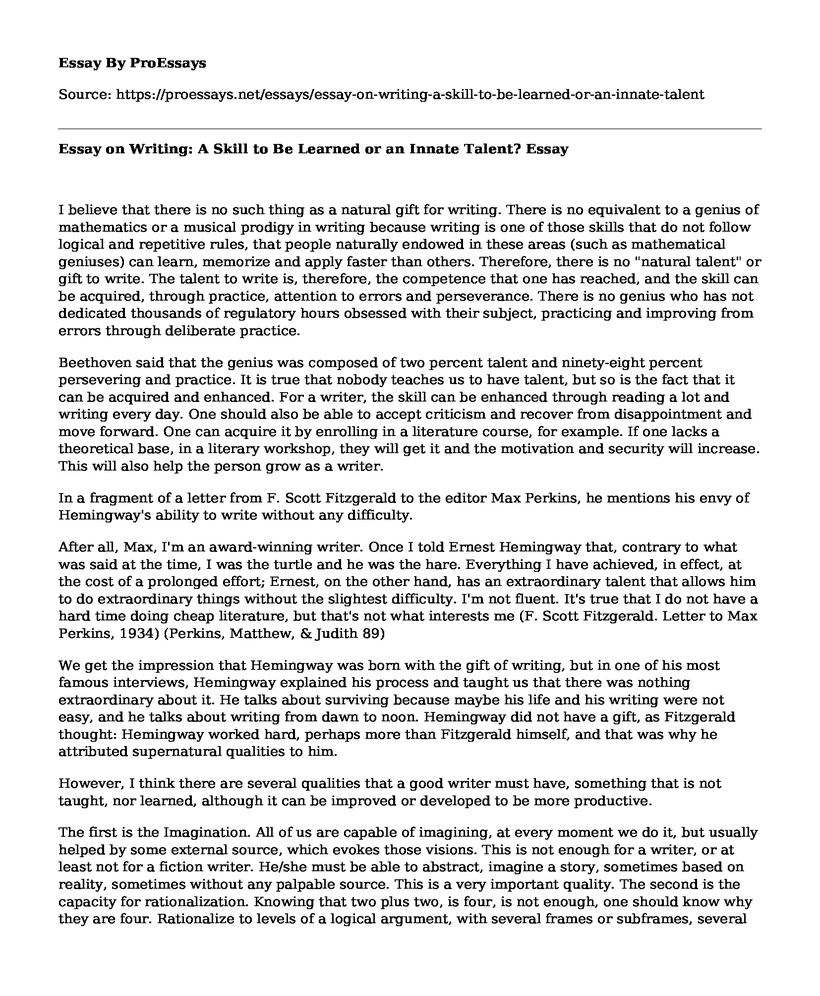I believe that there is no such thing as a natural gift for writing. There is no equivalent to a genius of mathematics or a musical prodigy in writing because writing is one of those skills that do not follow logical and repetitive rules, that people naturally endowed in these areas (such as mathematical geniuses) can learn, memorize and apply faster than others. Therefore, there is no "natural talent" or gift to write. The talent to write is, therefore, the competence that one has reached, and the skill can be acquired, through practice, attention to errors and perseverance. There is no genius who has not dedicated thousands of regulatory hours obsessed with their subject, practicing and improving from errors through deliberate practice.
Beethoven said that the genius was composed of two percent talent and ninety-eight percent persevering and practice. It is true that nobody teaches us to have talent, but so is the fact that it can be acquired and enhanced. For a writer, the skill can be enhanced through reading a lot and writing every day. One should also be able to accept criticism and recover from disappointment and move forward. One can acquire it by enrolling in a literature course, for example. If one lacks a theoretical base, in a literary workshop, they will get it and the motivation and security will increase. This will also help the person grow as a writer.
In a fragment of a letter from F. Scott Fitzgerald to the editor Max Perkins, he mentions his envy of Hemingway's ability to write without any difficulty.
After all, Max, I'm an award-winning writer. Once I told Ernest Hemingway that, contrary to what was said at the time, I was the turtle and he was the hare. Everything I have achieved, in effect, at the cost of a prolonged effort; Ernest, on the other hand, has an extraordinary talent that allows him to do extraordinary things without the slightest difficulty. I'm not fluent. It's true that I do not have a hard time doing cheap literature, but that's not what interests me (F. Scott Fitzgerald. Letter to Max Perkins, 1934) (Perkins, Matthew, & Judith 89)
We get the impression that Hemingway was born with the gift of writing, but in one of his most famous interviews, Hemingway explained his process and taught us that there was nothing extraordinary about it. He talks about surviving because maybe his life and his writing were not easy, and he talks about writing from dawn to noon. Hemingway did not have a gift, as Fitzgerald thought: Hemingway worked hard, perhaps more than Fitzgerald himself, and that was why he attributed supernatural qualities to him.
However, I think there are several qualities that a good writer must have, something that is not taught, nor learned, although it can be improved or developed to be more productive.
The first is the Imagination. All of us are capable of imagining, at every moment we do it, but usually helped by some external source, which evokes those visions. This is not enough for a writer, or at least not for a fiction writer. He/she must be able to abstract, imagine a story, sometimes based on reality, sometimes without any palpable source. This is a very important quality. The second is the capacity for rationalization. Knowing that two plus two, is four, is not enough, one should know why they are four. Rationalize to levels of a logical argument, with several frames or subframes, several points of view, it is only within the reach of a privileged few, just as quantum physics is not made for minds that get carried away instead of wondering about the why of things.
The third, and surely not the last quality inherent to the writer, is empathy. It is a quality that gives dynamism and depth to any story. It is based on putting oneself in the place, not only of the reader but also of the characters and the narrators. It is about feeling their motivations and the thoughts that make them act like this and not otherwise, sometimes even charging the argument that has to be rewritten by the author based on the emotions of their characters. It is the quality that will tell one if a story is interesting or not for the reader. If a writer is not able to connect with his story and his characters and make the reader do the same, he is not a good writer. After all, reading is an emotional experience. Anyone can become a writer if he/she has the intention and fervent desire to achieve it.
Work Cited
Perkins, Maxwell, Matthew J. Bruccoli, and Judith S. Baughman. The Sons of Maxwell Perkins: Letters of F. Scott Fitzgerald, Ernest Hemingway, Thomas Wolfe, and Their Editor. Columbia, SC: U of South Carolina, 2004. Print
Cite this page
Essay on Writing: A Skill to Be Learned or an Innate Talent?. (2022, Aug 23). Retrieved from https://proessays.net/essays/essay-on-writing-a-skill-to-be-learned-or-an-innate-talent
If you are the original author of this essay and no longer wish to have it published on the ProEssays website, please click below to request its removal:
- Literary Analysis Essay on Joseph Conrad's Heart of Darkness
- John McCosh Photography Essay
- Looks Aren't Everything: Believe Me, I'm a Model by Cameron Russell Essay
- Comparative Essay: Renoir, Luncheon at the Boating Party and Caravaggio, Narcissus
- Paper Example on Exploring Civilization and Nature in Heart of Darkness
- Essay Example on Spotify: From Piracy to a Billion-Dollar Music Streaming Giant
- Paper Example on Chimney Sweeper's Agony: William Blake's Poems on Innocent Children's Suffering







